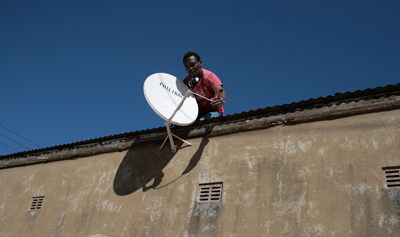As news of Middle Eastern and North African protests swirl around the globe, satellite television and the Internet prove vital sources of information for Africans as governments fearful of an informed citizenry and a free press such as in Eritrea, Equatorial Guinea, and Zimbabwe impose total news blackouts on the developments.
Nowhere is the news blackout more extreme than in Eritrea, where the government has banned independent media since 2001. Typing “Egypt” in the search field of the government news website Shabait returns about 50 results, the most recent and relevant of which is a December 3, 2010, item titled: “Presidents Isaias and Mubarak conduct discussion in Cairo.” Eritrean sources told CPJ, however, that satellite dishes in the capital Asmara’s rooftops allowed people to follow the unfolding events.
Earlier this month, Equatorial Guinea’s information minister, Jerónimo Osa Osa Ecoro, issued a statement accusing those who criticize the 32-year authoritarian ruler Teodoro Obiang’s election as the new president of the African Union of failing to “acknowledge the enormous steps” taken by Obiang toward democratization and human rights. Notwithstanding that Obiang won his last national election with 97 percent of the vote amid allegations of poll-rigging, it didn’t take long for this claim to be contradicted by a news blackout by the government-controlled national broadcaster RTVGE on protests in North Africa, according to news reports. Nevertheless, since February 11, satellite dishes in Malabo have allowed most people to access news and information, according to a local source. The same day the blackout started, Juan Tomás Ávila Laurel, editor of cultural magazine Atanga and a blogger with Spain-based online magazine Frontera Digital began a hunger strike that he vowed not to stop until a transitional government ushering democratic reforms was not put in place in Equatorial Guinea.
Flipping the pages of Zimbabwe’s government-controlled daily The Herald, Vincent Kahiya, editor-in-chief of the private Harare-based daily Newsday said to me on Thursday: “There is nothing on the international page on what’s happening in Bahrain, Libya, and so on.” Instead, he noted, “What we have seen is commentary on what they’re not reporting.” In fact, the ruling Zanu-PF-controlled state media has, among other things, accused the United States, which maintains sanctions restricting travel, financial, and business assets of President Robert Mugabe and members of the ruling Zanu-PF elite, of interfering in Egypt’s “rebellion.” Another journalist, whose name I have withheld for fear of government reprisals, shared in an e-mail: “I have DSTV [South Africa-based Digital Satellite Television] and I hardly watch Zimbabwean TV or read The Herald.” In fact, “CNN etc. is God-sent on these protests,” wrote another journalist. “Zimbabweans are talking about it, and there’s a lot of interest on those issues,” Kahiya said, adding that private newspapers reporting the North African developments were selling quickly.
In Ethiopia, a local journalist who spoke on condition of anonymity for fear of government reprisals used the term “silent report” to describe the coverage of the government-controlled Ethiopian Television and Radio Agency, explaining that the station limited newscasters to reading two or three paragraphs without further reporting. Nevertheless, “much of the public is well aware of the issues,” the source said, adding that even rural area people had access to satellite TV.
Ethiopian police became apparently angered by persecuted journalist Eskinder Nega’s coverage of the protests. Nega, whose weekly columns appear on U.S.-based news forum EthioMedia, was picked up on February 11 as he walked out of a café in the capital, Addis Ababa. He later reported that the Ethiopian deputy commissioner of police allegedly delivered to him a warning from the government for his alleged “to incite an Egyptian and Tunisian like protests in Ethiopia,” with his Internet writings. Nega’s columns compared and contrasted Egypt and Ethiopia in terms of the military’s role in politics, and pro-democracy movements, according to CPJ research.
In Djibouti, where a series of protests have erupted since last month, government-controlled state broadcaster Radio Télévision de Djibouti was also censoring news of the North African protests, a local journalist told CPJ on condition of anonymity for fear of government reprisals. However, few Djiboutians watch the channel and most people passionately follow developments through their satellite dishes, the journalist said.
In Gabon, where supporters of opposition supporters have been protesting since André Mba Obame claimed fraud had robbed him of victory in the August 2009 presidential elections and declared himself president, state media’s coverage of the North African protests has also been minimal, said independent editor Norbert Goua Mezuï. “I don’t even watch the national channels, I do when I stumble on them,” he said, “but we rely on France 24, Africa 24, TV5, TF1, and France 2 to tell us what is really happening elsewhere.”
